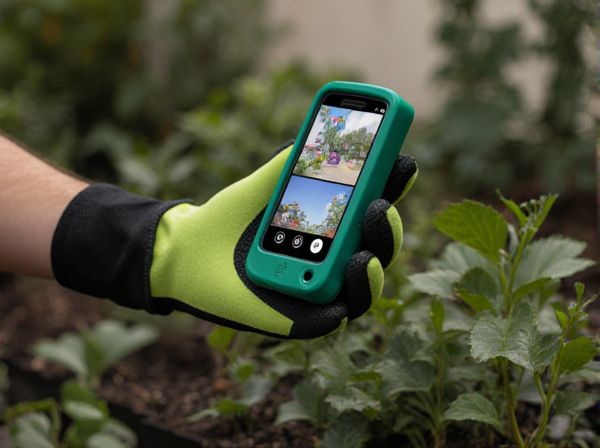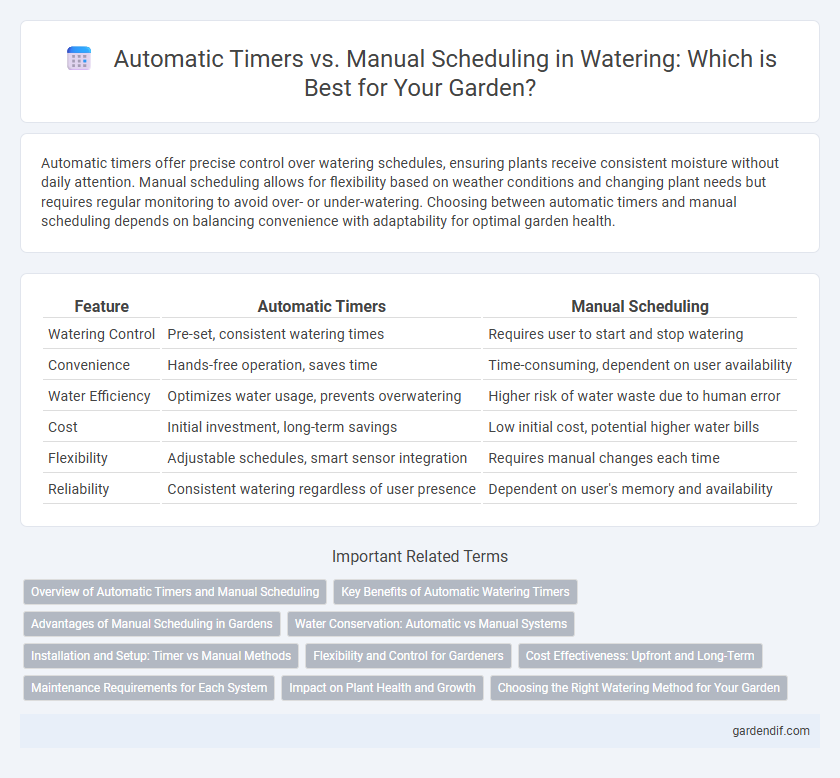
Automatic timers vs Manual scheduling Illustration
Automatic timers offer precise control over watering schedules, ensuring plants receive consistent moisture without daily attention. Manual scheduling allows for flexibility based on weather conditions and changing plant needs but requires regular monitoring to avoid over- or under-watering. Choosing between automatic timers and manual scheduling depends on balancing convenience with adaptability for optimal garden health.
Table of Comparison
| Feature | Automatic Timers | Manual Scheduling |
|---|---|---|
| Watering Control | Pre-set, consistent watering times | Requires user to start and stop watering |
| Convenience | Hands-free operation, saves time | Time-consuming, dependent on user availability |
| Water Efficiency | Optimizes water usage, prevents overwatering | Higher risk of water waste due to human error |
| Cost | Initial investment, long-term savings | Low initial cost, potential higher water bills |
| Flexibility | Adjustable schedules, smart sensor integration | Requires manual changes each time |
| Reliability | Consistent watering regardless of user presence | Dependent on user's memory and availability |
Overview of Automatic Timers and Manual Scheduling
Automatic timers provide precise control over watering schedules by activating irrigation systems at preset times, ensuring consistent and efficient water use. Manual scheduling requires active monitoring and adjustment based on weather conditions and plant needs, which can lead to water waste or under-watering if not managed carefully. Integrating soil moisture sensors with automatic timers enhances watering accuracy compared to manual schedules that rely solely on human judgment.
Key Benefits of Automatic Watering Timers
Automatic watering timers ensure consistent irrigation schedules, reducing water waste and promoting healthier plant growth. They offer precise control over watering duration and frequency, adapting to seasonal changes without manual intervention. This technology enhances convenience and efficiency, saving time and preventing under- or over-watering.
Advantages of Manual Scheduling in Gardens
Manual scheduling in garden watering allows precise control over the timing and duration based on current weather conditions and plant needs, optimizing water usage and promoting healthier growth. Gardeners can easily adjust watering times to account for rainfall or drought, reducing water waste compared to fixed automatic timers. This flexibility ensures customized care, which is particularly beneficial for diverse plant species with varying hydration requirements.
Water Conservation: Automatic vs Manual Systems
Automatic watering timers optimize water conservation by delivering precise irrigation based on preset schedules and weather data, reducing human error and overwatering. Manual watering schedules often lead to inconsistent application and increased water waste due to lack of real-time adjustments and reliance on user memory. Integrating automatic systems with sensor technology maximizes efficiency, ensuring plants receive the exact moisture needed while conserving valuable water resources.
Installation and Setup: Timer vs Manual Methods
Automatic timers simplify the installation and setup process by allowing straightforward programming through digital interfaces, reducing the need for constant manual adjustments. Manual scheduling requires more hands-on effort, as users must physically turn watering systems on and off or set reminders to maintain consistent irrigation. Timers optimize water usage by enabling precise control over watering duration and frequency, minimizing human error common with manual methods.
Flexibility and Control for Gardeners
Automatic timers provide precise watering schedules that ensure consistent moisture levels, reducing water waste and promoting healthy plant growth. Manual scheduling offers gardeners full control to adapt watering times based on weather conditions and plant needs, enhancing flexibility. Combining both methods allows for efficient water management tailored to specific garden requirements.
Cost Effectiveness: Upfront and Long-Term
Automatic timers offer upfront savings by reducing water waste through precise scheduling, leading to lower utility bills over time. Manual scheduling eliminates initial equipment costs but often results in inconsistent watering and higher water usage, increasing long-term expenses. Investing in automatic timers typically proves more cost-effective by optimizing water efficiency and minimizing maintenance needs.
Maintenance Requirements for Each System
Automatic timers require minimal maintenance, generally needing only periodic battery replacements or power checks to ensure consistent operation. Manual scheduling demands regular attention to adjust watering times based on weather changes and plant growth, which can be time-consuming and prone to human error. Automatic systems often include built-in moisture sensors that further reduce maintenance by preventing overwatering and optimizing efficiency.
Impact on Plant Health and Growth
Automatic timers ensure consistent watering schedules that optimize soil moisture levels, promoting healthier root development and steady plant growth. Manual scheduling can lead to irregular watering patterns, increasing risks of under- or over-watering, which stress plants and impede nutrient uptake. Using automatic timers enhances plant health by maintaining precise hydration tailored to specific species' needs.
Choosing the Right Watering Method for Your Garden
Automatic timers ensure consistent and precise watering schedules, reducing the risk of overwatering or underwatering crucial for plant health. Manual scheduling offers flexibility to adjust watering based on real-time weather conditions and specific garden needs but requires more attention and effort. Selecting the right method depends on garden size, plant types, and the gardener's availability to maintain optimal soil moisture levels.
Automatic timers vs Manual scheduling Infographic

 gardendif.com
gardendif.com